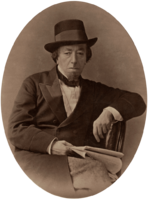Second Disraeli ministry facts for kids
Quick facts for kids Beaconsfield ministry |
|
|---|---|
| 1874–1880 | |

Disraeli as Lord Beaconsfield (1878)
|
|
| Date formed | 20 February 1874 |
| Date dissolved | 21 April 1880 |
| People and organisations | |
| Monarch | Victoria |
| Prime Minister | Lord Beaconsfield |
| Total no. of members | 108 appointments |
| Member party | Conservative Party |
| Status in legislature | Majority |
| Opposition party | Liberal Party |
| Opposition leaders |
|
| History | |
| Election(s) | 1874 general election |
| Outgoing election | 1880 general election |
| Legislature term(s) | 21st UK Parliament |
| Predecessor | First Gladstone ministry |
| Successor | Second Gladstone ministry |
Benjamin Disraeli became the Prime Minister of the United Kingdom for the second time in 1874. This happened after the government led by William Ewart Gladstone lost the election in 1874. Queen Victoria then asked Disraeli to form a new government.
Disraeli's time as Prime Minister lasted for about six years. His approach to dealing with other countries, known as his foreign policy, was not liked by Gladstone. After Gladstone gave many speeches across the country, Disraeli's government lost the next election in 1880 by a lot. Gladstone then became Prime Minister again. Disraeli, who was already unwell and had been given the title of Earl of Beaconsfield, passed away in April 1881.
Benjamin Disraeli's Government (1874-1880)
A government cabinet is like a team of important people who help the Prime Minister run the country. Each person in the cabinet is in charge of a different area, like money, foreign affairs, or safety at home.
Key Cabinet Members
Here are some of the main people who were part of Benjamin Disraeli's cabinet from February 1874 to April 1880:
| Job Title | Person in Charge | Time in Office |
|---|---|---|
| First Lord of the Treasury (Prime Minister) | Benjamin Disraeli† | February 1874 – April 1880 |
| Lord Chancellor (Head of the Justice System) | The Lord Cairns§ | February 1874 – April 1880 |
| Lord President of the Council (Oversees Government Business) | The Duke of Richmond | February 1874 – April 1880 |
| Lord Privy Seal (Keeper of the Queen's Seal) | The Earl of Malmesbury | February 1874 – August 1876 |
| The Earl of Beaconsfield | August 1876 – April 1878 | |
| The Duke of Northumberland | April 1878 – April 1880 | |
| Home Secretary (In charge of Law and Order) | Richard A. Cross | February 1874 – April 1880 |
| Foreign Secretary (Deals with Other Countries) | The Earl of Derby | February 1874 – April 1878 |
| The Marquess of Salisbury | April 1878 – April 1880 | |
| Secretary of State for the Colonies (Manages British Colonies) | The Earl of Carnarvon | February 1874 – February 1878 |
| Sir Michael Hicks-Beach, Bt | February 1878 – April 1880 | |
| Secretary of State for War (In charge of the Army) | Gathorne Hardy‡ | February 1874 – April 1878 |
| Sir Frederick Stanley | April 1878 – April 1880 | |
| Secretary of State for India (Manages British India) | The Marquess of Salisbury | February 1874 – April 1878 |
| The Viscount Cranbrook | April 1878 – April 1880 | |
| Chancellor of the Exchequer (In charge of Government Money) | Sir Stafford Northcote, Bt | February 1874 – April 1880 |
| First Lord of the Admiralty (In charge of the Navy) | George Ward Hunt | February 1874 – August 1877 |
| William Henry Smith | August 1877 – April 1880 | |
| President of the Board of Trade (Deals with Business and Trade) | Viscount Sandon | April 1878 – April 1880 |
| Postmaster General (Runs the Postal Service) | Lord John Manners | February 1874 – April 1880 |
| Chief Secretary for Ireland (Manages Affairs in Ireland) | Sir Michael Hicks-Beach, Bt | August 1877 – February 1878 |
| Leader of the House of Commons (Leads Government in Parliament) | Benjamin Disraeli | February 1874 – August 1876 |
| Sir Stafford Northcote, Bt | August 1876 – April 1880 | |
| Leader of the House of Lords (Leads Government in the House of Lords) | The Duke of Richmond | February 1874 – August 1876 |
| The Earl of Beaconsfield | August 1876 – April 1880 |
† Became The Earl of Beaconsfield in August 1876.
§ Became The Earl Cairns in September 1878.
‡ Became The Viscount Cranbrook in May 1878.
Changes in the Cabinet
Over the years, some members of the cabinet changed their roles or new people joined:
- August 1876: Disraeli, who was already Prime Minister, also took on the role of Lord Privy Seal.
- August 1877: George Ward Hunt, who was in charge of the Navy, sadly passed away. William Henry Smith took over his role. Sir Michael Hicks-Beach, who was the Chief Secretary for Ireland, also joined the main cabinet team.
- February 1878: Sir Michael Hicks-Beach became the Colonial Secretary, managing the British colonies.
- April 1878: There were several changes:
- The Duke of Northumberland became the Lord Privy Seal.
- The Marquess of Salisbury became the Foreign Secretary, dealing with other countries.
- The Viscount Cranbrook took over as Secretary of State for India.
- Sir Frederick Stanley became the Secretary of State for War, in charge of the army.
 | Jackie Robinson |
 | Jack Johnson |
 | Althea Gibson |
 | Arthur Ashe |
 | Muhammad Ali |

